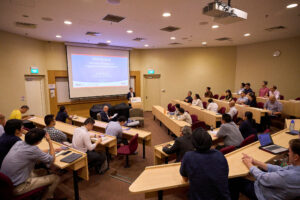Abstract
How can countries across the Indo-Pacific fashion strategies to deal with an increasingly fragmented and multipolar world? American strategists have experience with bipolarity during the Cold War as well as the unipolar moment that followed, but multipolarity presents new challenges. In particular, Washington will have to learn to build small and nimble coalitions around specific issues, rather than relying primarily on fixed alliances. This talk will assess American efforts in recent years and discuss how the United States can improve its approach—particularly with regard to Southeast Asia—in the years ahead.
About the Speaker
Zack Cooper is a senior fellow at the American Enterprise Institute, where he studies US strategy in Asia, including alliance dynamics and US-China competition. He also teaches at Princeton University and serves as chair of the board of the Open Technology Fund. He is currently writing a book for Yale University Press that explains how militaries change during power shifts.
Before joining AEI, Dr. Cooper was the senior fellow for Asian security at the Centre for Strategic and International Studies (CSIS). He previously worked as codirector of the Alliance for Securing Democracy and senior fellow at the German Marshall Fund of the United States and research fellow at the Centre for Strategic and Budgetary Assessments. He also served as assistant to the deputy national security adviser for combating terrorism at the National Security Council and as a special assistant to the principal deputy under secretary of defence for policy at the Department of Defence.
Dr. Cooper has published research reports on a number of aspects of US strategy and alliances in Asia. He has also co-authored several books and written articles for academic journals and popular press, including International Security, Security Studies, Foreign Affairs, the New York Times, the Washington Post, and the Wall Street Journal, among other outlets. Dr. Cooper graduated from Princeton University with a PhD and an MA in security studies and an MPA in international relations. He received a BA in public policy from Stanford University.



 Add to Google calendar
Add to Google calendar
 Add to Outlook calendar
Add to Outlook calendar


